Ethical Business Communication: A Prerequisite for Modern Business
VerifiedAdded on 2021/09/19
|9
|2250
|85
Essay
AI Summary
This essay argues that ethical communication is integral to modern business, enhancing employee respect and job satisfaction by fostering a climate of mutual respect and enabling employees to exhibit free will. While acknowledging potential drawbacks such as reduced competitive spirit and challenges in implementing employee suggestions, the essay contends that the benefits of ethical communication, including improved clarity and reduced employee turnover, outweigh the disadvantages. The essay concludes that ethical communication is essential for creating a positive and productive work culture in contemporary organizations.
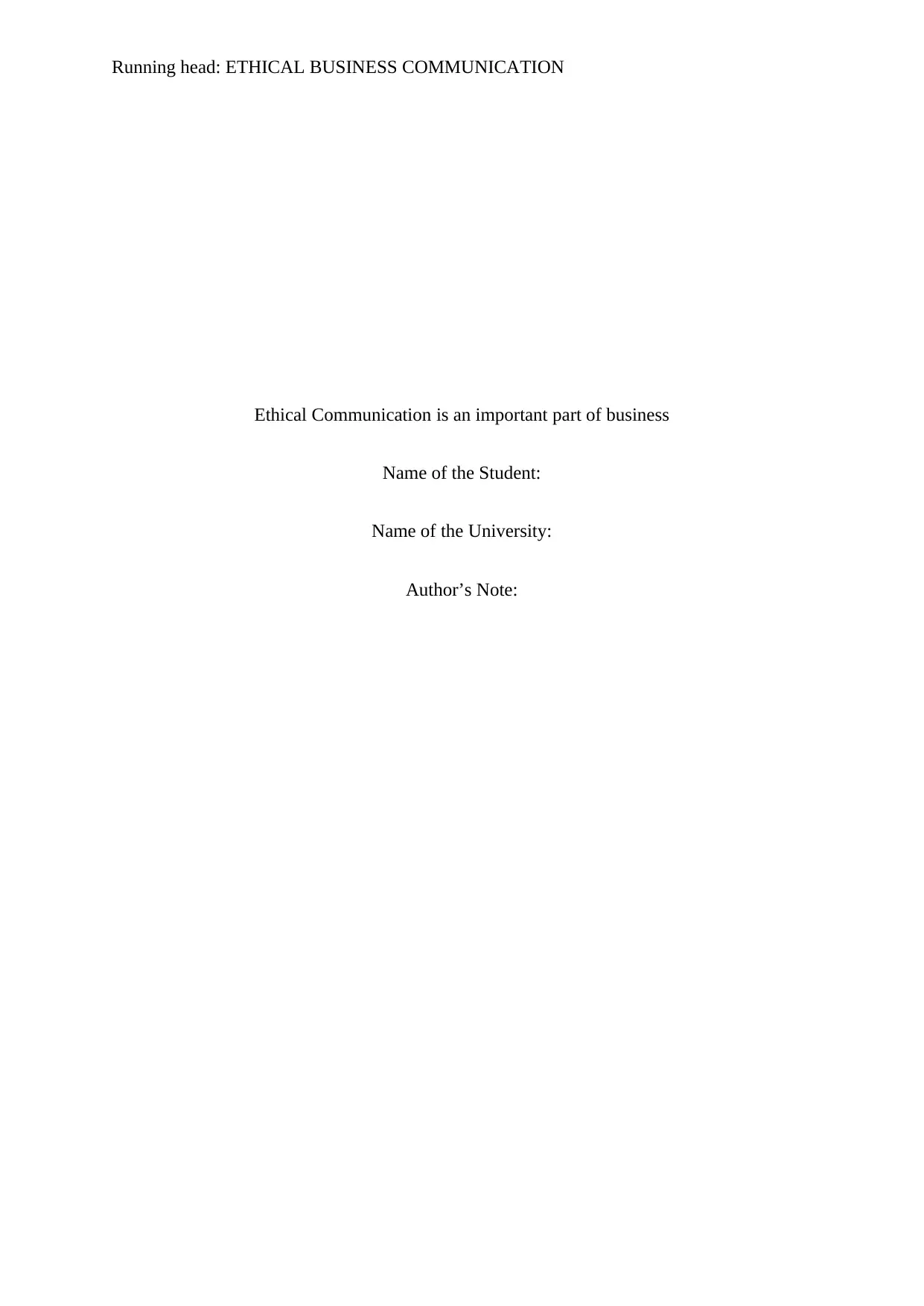
Running head: ETHICAL BUSINESS COMMUNICATION
Ethical Communication is an important part of business
Name of the Student:
Name of the University:
Author’s Note:
Ethical Communication is an important part of business
Name of the Student:
Name of the University:
Author’s Note:
Paraphrase This Document
Need a fresh take? Get an instant paraphrase of this document with our AI Paraphraser
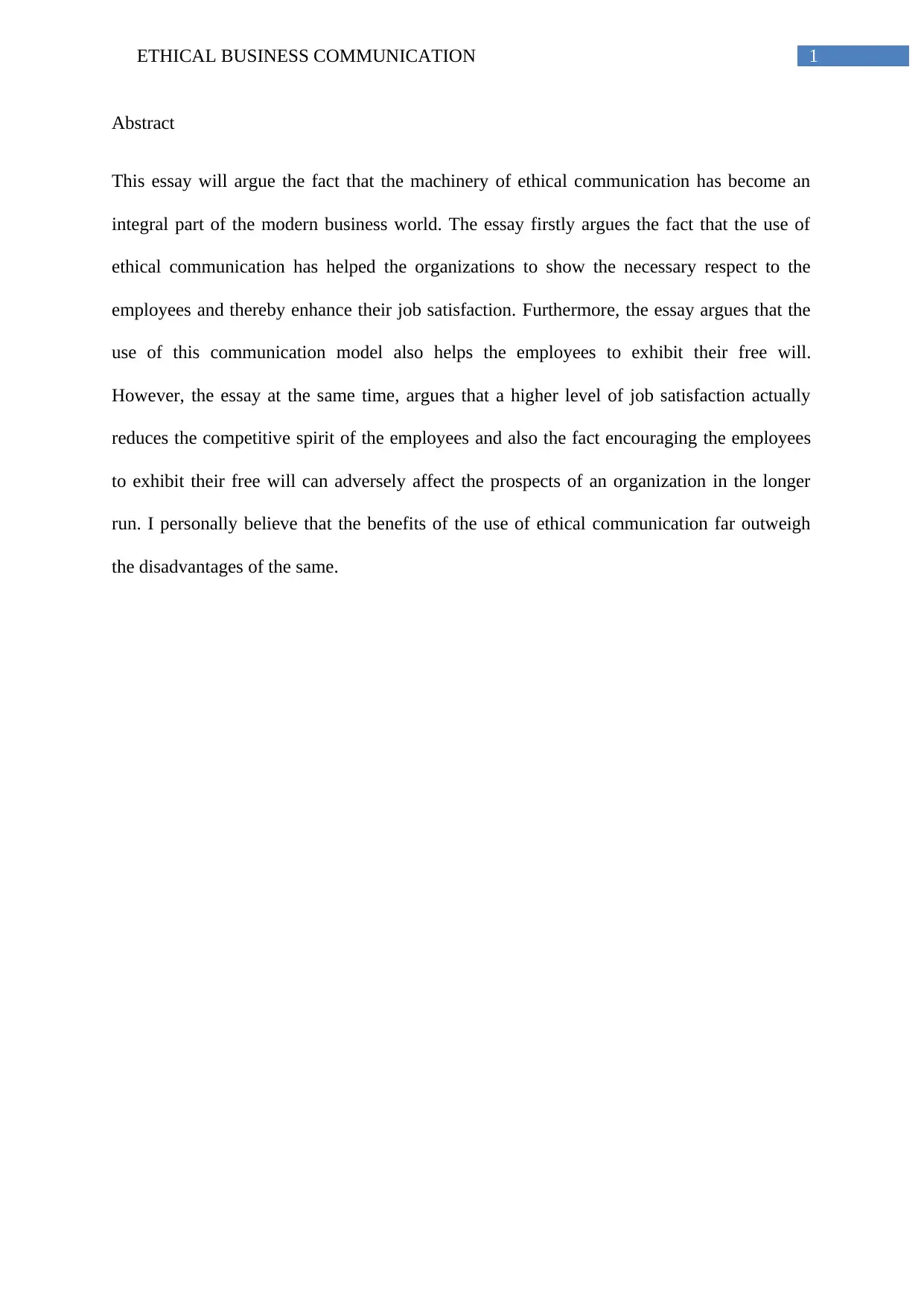
1ETHICAL BUSINESS COMMUNICATION
Abstract
This essay will argue the fact that the machinery of ethical communication has become an
integral part of the modern business world. The essay firstly argues the fact that the use of
ethical communication has helped the organizations to show the necessary respect to the
employees and thereby enhance their job satisfaction. Furthermore, the essay argues that the
use of this communication model also helps the employees to exhibit their free will.
However, the essay at the same time, argues that a higher level of job satisfaction actually
reduces the competitive spirit of the employees and also the fact encouraging the employees
to exhibit their free will can adversely affect the prospects of an organization in the longer
run. I personally believe that the benefits of the use of ethical communication far outweigh
the disadvantages of the same.
Abstract
This essay will argue the fact that the machinery of ethical communication has become an
integral part of the modern business world. The essay firstly argues the fact that the use of
ethical communication has helped the organizations to show the necessary respect to the
employees and thereby enhance their job satisfaction. Furthermore, the essay argues that the
use of this communication model also helps the employees to exhibit their free will.
However, the essay at the same time, argues that a higher level of job satisfaction actually
reduces the competitive spirit of the employees and also the fact encouraging the employees
to exhibit their free will can adversely affect the prospects of an organization in the longer
run. I personally believe that the benefits of the use of ethical communication far outweigh
the disadvantages of the same.
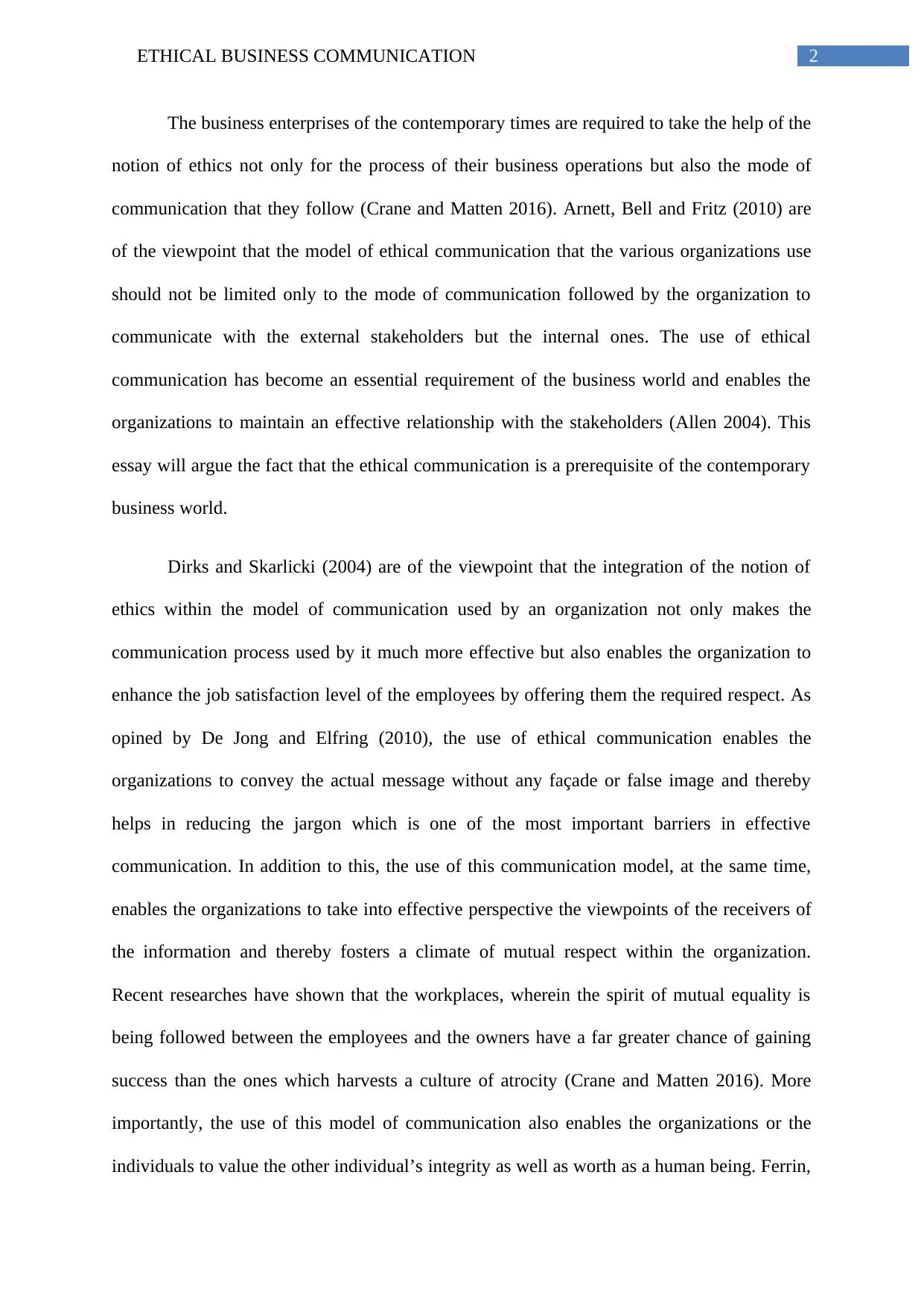
2ETHICAL BUSINESS COMMUNICATION
The business enterprises of the contemporary times are required to take the help of the
notion of ethics not only for the process of their business operations but also the mode of
communication that they follow (Crane and Matten 2016). Arnett, Bell and Fritz (2010) are
of the viewpoint that the model of ethical communication that the various organizations use
should not be limited only to the mode of communication followed by the organization to
communicate with the external stakeholders but the internal ones. The use of ethical
communication has become an essential requirement of the business world and enables the
organizations to maintain an effective relationship with the stakeholders (Allen 2004). This
essay will argue the fact that the ethical communication is a prerequisite of the contemporary
business world.
Dirks and Skarlicki (2004) are of the viewpoint that the integration of the notion of
ethics within the model of communication used by an organization not only makes the
communication process used by it much more effective but also enables the organization to
enhance the job satisfaction level of the employees by offering them the required respect. As
opined by De Jong and Elfring (2010), the use of ethical communication enables the
organizations to convey the actual message without any façade or false image and thereby
helps in reducing the jargon which is one of the most important barriers in effective
communication. In addition to this, the use of this communication model, at the same time,
enables the organizations to take into effective perspective the viewpoints of the receivers of
the information and thereby fosters a climate of mutual respect within the organization.
Recent researches have shown that the workplaces, wherein the spirit of mutual equality is
being followed between the employees and the owners have a far greater chance of gaining
success than the ones which harvests a culture of atrocity (Crane and Matten 2016). More
importantly, the use of this model of communication also enables the organizations or the
individuals to value the other individual’s integrity as well as worth as a human being. Ferrin,
The business enterprises of the contemporary times are required to take the help of the
notion of ethics not only for the process of their business operations but also the mode of
communication that they follow (Crane and Matten 2016). Arnett, Bell and Fritz (2010) are
of the viewpoint that the model of ethical communication that the various organizations use
should not be limited only to the mode of communication followed by the organization to
communicate with the external stakeholders but the internal ones. The use of ethical
communication has become an essential requirement of the business world and enables the
organizations to maintain an effective relationship with the stakeholders (Allen 2004). This
essay will argue the fact that the ethical communication is a prerequisite of the contemporary
business world.
Dirks and Skarlicki (2004) are of the viewpoint that the integration of the notion of
ethics within the model of communication used by an organization not only makes the
communication process used by it much more effective but also enables the organization to
enhance the job satisfaction level of the employees by offering them the required respect. As
opined by De Jong and Elfring (2010), the use of ethical communication enables the
organizations to convey the actual message without any façade or false image and thereby
helps in reducing the jargon which is one of the most important barriers in effective
communication. In addition to this, the use of this communication model, at the same time,
enables the organizations to take into effective perspective the viewpoints of the receivers of
the information and thereby fosters a climate of mutual respect within the organization.
Recent researches have shown that the workplaces, wherein the spirit of mutual equality is
being followed between the employees and the owners have a far greater chance of gaining
success than the ones which harvests a culture of atrocity (Crane and Matten 2016). More
importantly, the use of this model of communication also enables the organizations or the
individuals to value the other individual’s integrity as well as worth as a human being. Ferrin,
⊘ This is a preview!⊘
Do you want full access?
Subscribe today to unlock all pages.

Trusted by 1+ million students worldwide
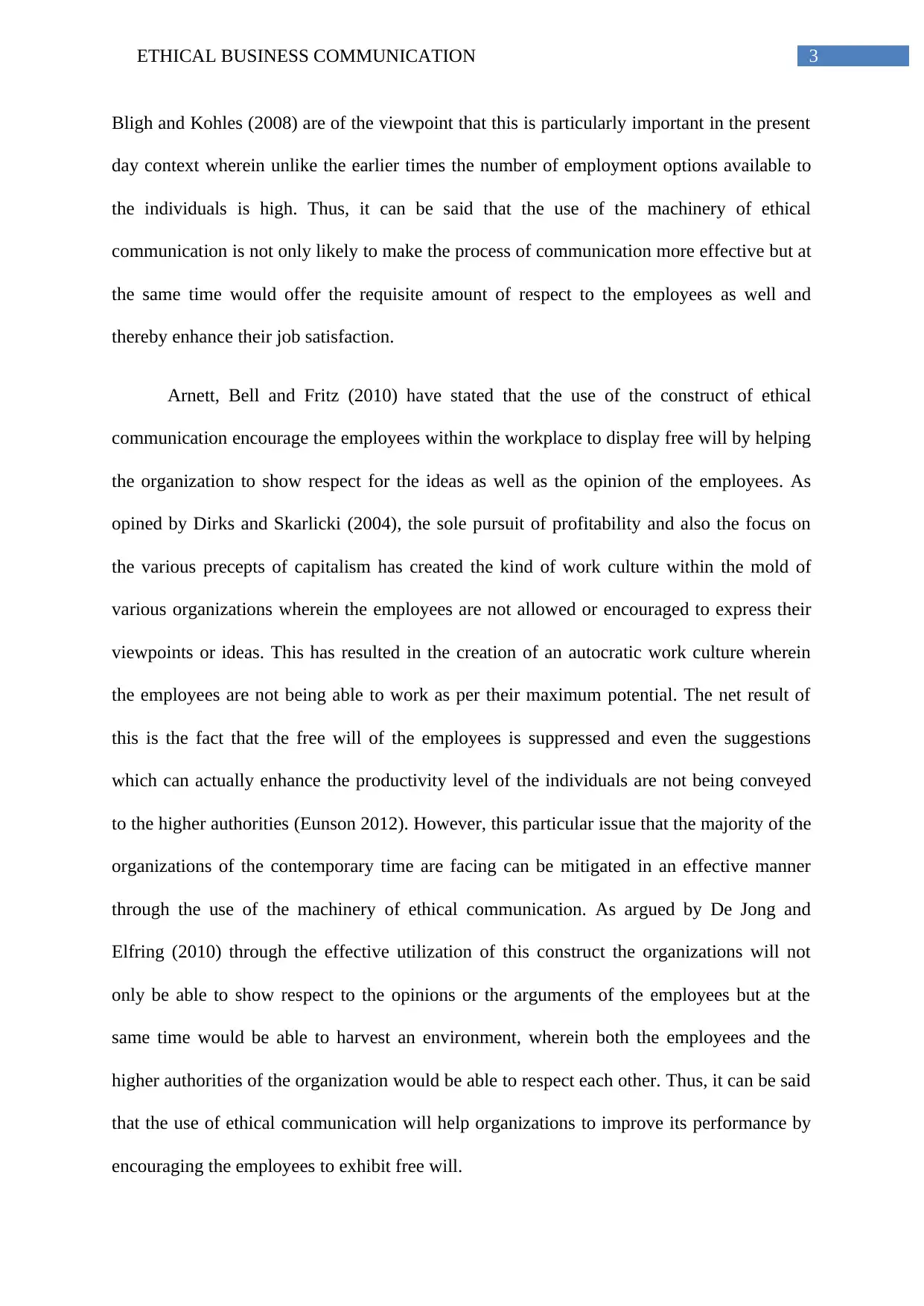
3ETHICAL BUSINESS COMMUNICATION
Bligh and Kohles (2008) are of the viewpoint that this is particularly important in the present
day context wherein unlike the earlier times the number of employment options available to
the individuals is high. Thus, it can be said that the use of the machinery of ethical
communication is not only likely to make the process of communication more effective but at
the same time would offer the requisite amount of respect to the employees as well and
thereby enhance their job satisfaction.
Arnett, Bell and Fritz (2010) have stated that the use of the construct of ethical
communication encourage the employees within the workplace to display free will by helping
the organization to show respect for the ideas as well as the opinion of the employees. As
opined by Dirks and Skarlicki (2004), the sole pursuit of profitability and also the focus on
the various precepts of capitalism has created the kind of work culture within the mold of
various organizations wherein the employees are not allowed or encouraged to express their
viewpoints or ideas. This has resulted in the creation of an autocratic work culture wherein
the employees are not being able to work as per their maximum potential. The net result of
this is the fact that the free will of the employees is suppressed and even the suggestions
which can actually enhance the productivity level of the individuals are not being conveyed
to the higher authorities (Eunson 2012). However, this particular issue that the majority of the
organizations of the contemporary time are facing can be mitigated in an effective manner
through the use of the machinery of ethical communication. As argued by De Jong and
Elfring (2010) through the effective utilization of this construct the organizations will not
only be able to show respect to the opinions or the arguments of the employees but at the
same time would be able to harvest an environment, wherein both the employees and the
higher authorities of the organization would be able to respect each other. Thus, it can be said
that the use of ethical communication will help organizations to improve its performance by
encouraging the employees to exhibit free will.
Bligh and Kohles (2008) are of the viewpoint that this is particularly important in the present
day context wherein unlike the earlier times the number of employment options available to
the individuals is high. Thus, it can be said that the use of the machinery of ethical
communication is not only likely to make the process of communication more effective but at
the same time would offer the requisite amount of respect to the employees as well and
thereby enhance their job satisfaction.
Arnett, Bell and Fritz (2010) have stated that the use of the construct of ethical
communication encourage the employees within the workplace to display free will by helping
the organization to show respect for the ideas as well as the opinion of the employees. As
opined by Dirks and Skarlicki (2004), the sole pursuit of profitability and also the focus on
the various precepts of capitalism has created the kind of work culture within the mold of
various organizations wherein the employees are not allowed or encouraged to express their
viewpoints or ideas. This has resulted in the creation of an autocratic work culture wherein
the employees are not being able to work as per their maximum potential. The net result of
this is the fact that the free will of the employees is suppressed and even the suggestions
which can actually enhance the productivity level of the individuals are not being conveyed
to the higher authorities (Eunson 2012). However, this particular issue that the majority of the
organizations of the contemporary time are facing can be mitigated in an effective manner
through the use of the machinery of ethical communication. As argued by De Jong and
Elfring (2010) through the effective utilization of this construct the organizations will not
only be able to show respect to the opinions or the arguments of the employees but at the
same time would be able to harvest an environment, wherein both the employees and the
higher authorities of the organization would be able to respect each other. Thus, it can be said
that the use of ethical communication will help organizations to improve its performance by
encouraging the employees to exhibit free will.
Paraphrase This Document
Need a fresh take? Get an instant paraphrase of this document with our AI Paraphraser
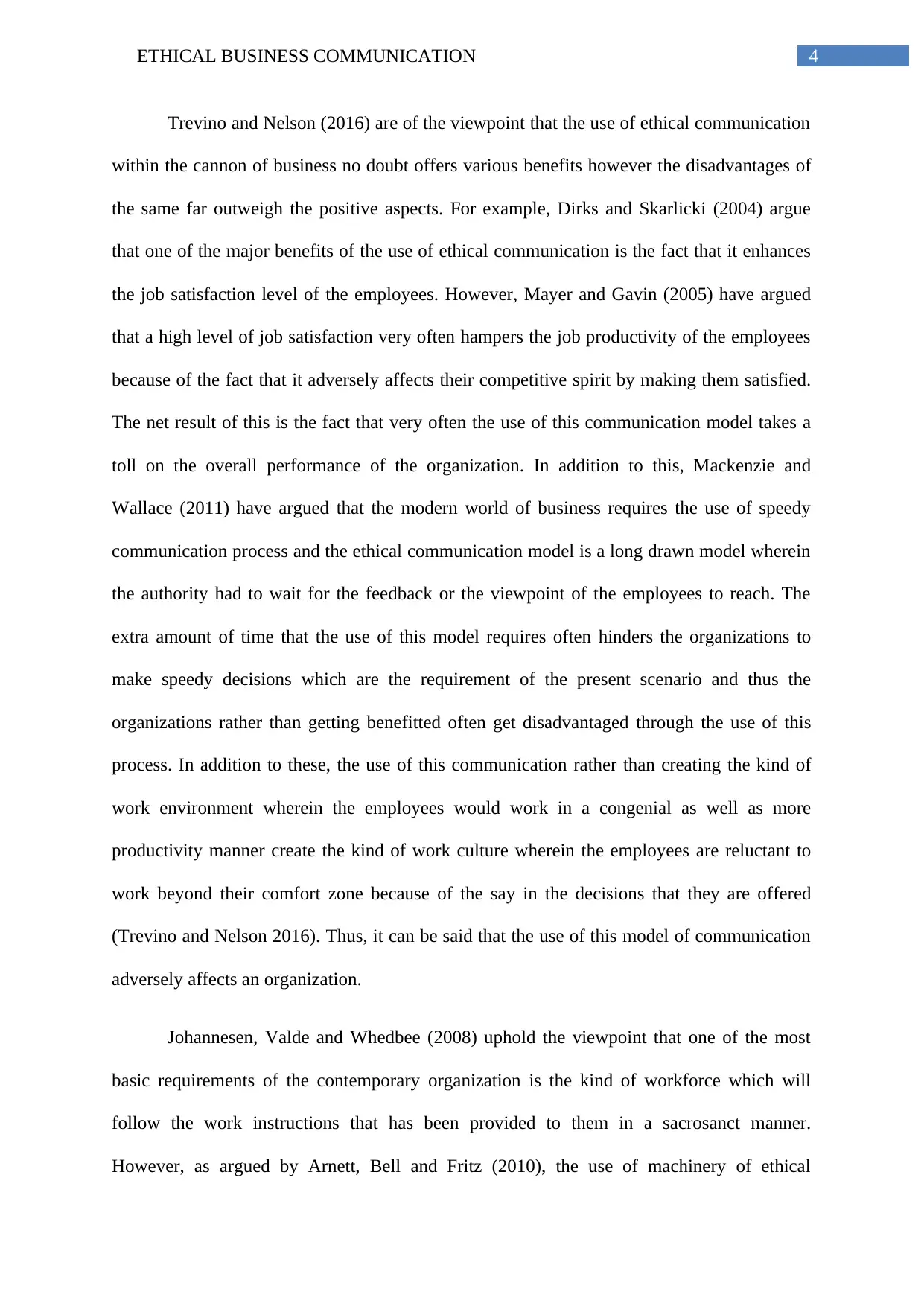
4ETHICAL BUSINESS COMMUNICATION
Trevino and Nelson (2016) are of the viewpoint that the use of ethical communication
within the cannon of business no doubt offers various benefits however the disadvantages of
the same far outweigh the positive aspects. For example, Dirks and Skarlicki (2004) argue
that one of the major benefits of the use of ethical communication is the fact that it enhances
the job satisfaction level of the employees. However, Mayer and Gavin (2005) have argued
that a high level of job satisfaction very often hampers the job productivity of the employees
because of the fact that it adversely affects their competitive spirit by making them satisfied.
The net result of this is the fact that very often the use of this communication model takes a
toll on the overall performance of the organization. In addition to this, Mackenzie and
Wallace (2011) have argued that the modern world of business requires the use of speedy
communication process and the ethical communication model is a long drawn model wherein
the authority had to wait for the feedback or the viewpoint of the employees to reach. The
extra amount of time that the use of this model requires often hinders the organizations to
make speedy decisions which are the requirement of the present scenario and thus the
organizations rather than getting benefitted often get disadvantaged through the use of this
process. In addition to these, the use of this communication rather than creating the kind of
work environment wherein the employees would work in a congenial as well as more
productivity manner create the kind of work culture wherein the employees are reluctant to
work beyond their comfort zone because of the say in the decisions that they are offered
(Trevino and Nelson 2016). Thus, it can be said that the use of this model of communication
adversely affects an organization.
Johannesen, Valde and Whedbee (2008) uphold the viewpoint that one of the most
basic requirements of the contemporary organization is the kind of workforce which will
follow the work instructions that has been provided to them in a sacrosanct manner.
However, as argued by Arnett, Bell and Fritz (2010), the use of machinery of ethical
Trevino and Nelson (2016) are of the viewpoint that the use of ethical communication
within the cannon of business no doubt offers various benefits however the disadvantages of
the same far outweigh the positive aspects. For example, Dirks and Skarlicki (2004) argue
that one of the major benefits of the use of ethical communication is the fact that it enhances
the job satisfaction level of the employees. However, Mayer and Gavin (2005) have argued
that a high level of job satisfaction very often hampers the job productivity of the employees
because of the fact that it adversely affects their competitive spirit by making them satisfied.
The net result of this is the fact that very often the use of this communication model takes a
toll on the overall performance of the organization. In addition to this, Mackenzie and
Wallace (2011) have argued that the modern world of business requires the use of speedy
communication process and the ethical communication model is a long drawn model wherein
the authority had to wait for the feedback or the viewpoint of the employees to reach. The
extra amount of time that the use of this model requires often hinders the organizations to
make speedy decisions which are the requirement of the present scenario and thus the
organizations rather than getting benefitted often get disadvantaged through the use of this
process. In addition to these, the use of this communication rather than creating the kind of
work environment wherein the employees would work in a congenial as well as more
productivity manner create the kind of work culture wherein the employees are reluctant to
work beyond their comfort zone because of the say in the decisions that they are offered
(Trevino and Nelson 2016). Thus, it can be said that the use of this model of communication
adversely affects an organization.
Johannesen, Valde and Whedbee (2008) uphold the viewpoint that one of the most
basic requirements of the contemporary organization is the kind of workforce which will
follow the work instructions that has been provided to them in a sacrosanct manner.
However, as argued by Arnett, Bell and Fritz (2010), the use of machinery of ethical
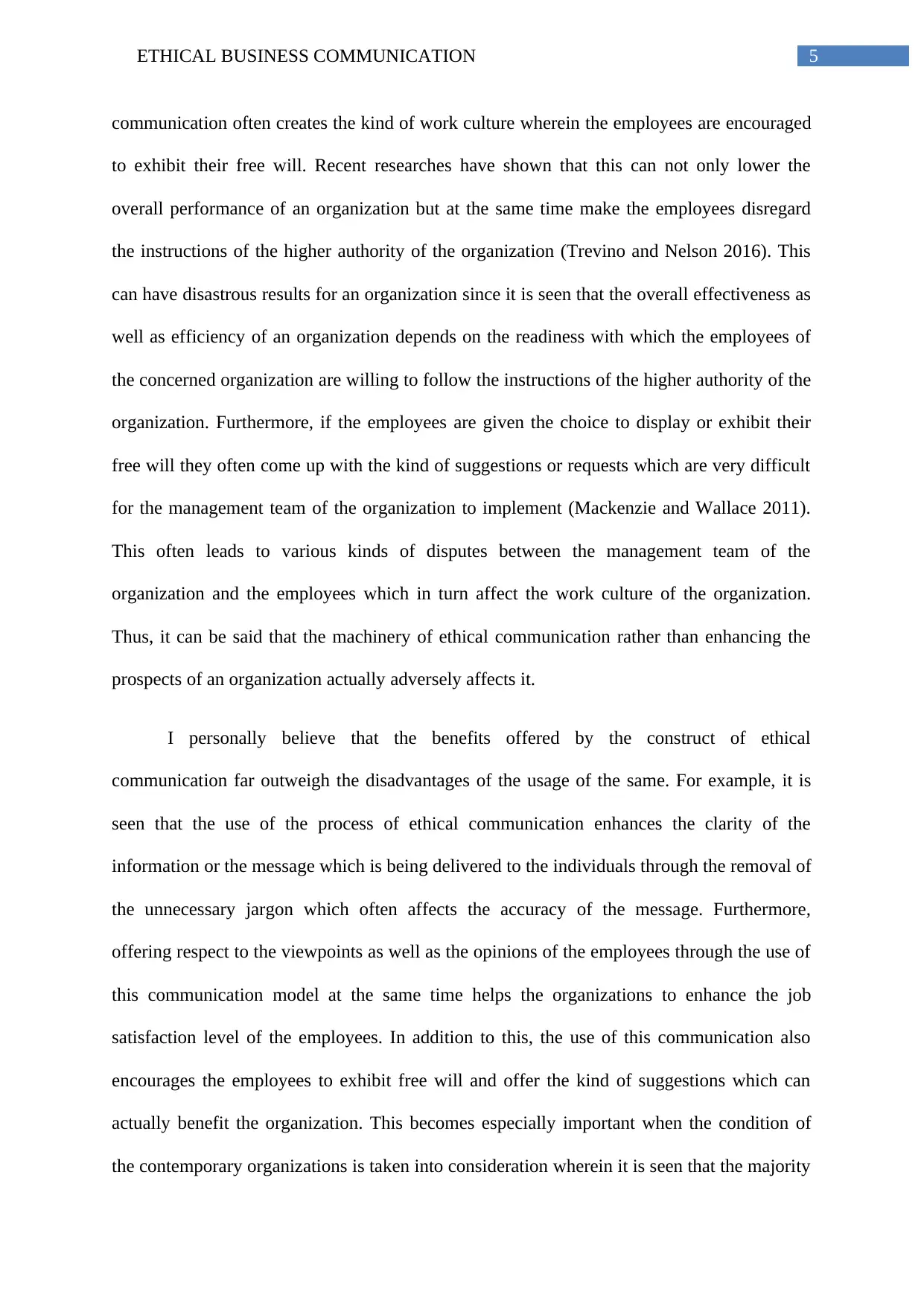
5ETHICAL BUSINESS COMMUNICATION
communication often creates the kind of work culture wherein the employees are encouraged
to exhibit their free will. Recent researches have shown that this can not only lower the
overall performance of an organization but at the same time make the employees disregard
the instructions of the higher authority of the organization (Trevino and Nelson 2016). This
can have disastrous results for an organization since it is seen that the overall effectiveness as
well as efficiency of an organization depends on the readiness with which the employees of
the concerned organization are willing to follow the instructions of the higher authority of the
organization. Furthermore, if the employees are given the choice to display or exhibit their
free will they often come up with the kind of suggestions or requests which are very difficult
for the management team of the organization to implement (Mackenzie and Wallace 2011).
This often leads to various kinds of disputes between the management team of the
organization and the employees which in turn affect the work culture of the organization.
Thus, it can be said that the machinery of ethical communication rather than enhancing the
prospects of an organization actually adversely affects it.
I personally believe that the benefits offered by the construct of ethical
communication far outweigh the disadvantages of the usage of the same. For example, it is
seen that the use of the process of ethical communication enhances the clarity of the
information or the message which is being delivered to the individuals through the removal of
the unnecessary jargon which often affects the accuracy of the message. Furthermore,
offering respect to the viewpoints as well as the opinions of the employees through the use of
this communication model at the same time helps the organizations to enhance the job
satisfaction level of the employees. In addition to this, the use of this communication also
encourages the employees to exhibit free will and offer the kind of suggestions which can
actually benefit the organization. This becomes especially important when the condition of
the contemporary organizations is taken into consideration wherein it is seen that the majority
communication often creates the kind of work culture wherein the employees are encouraged
to exhibit their free will. Recent researches have shown that this can not only lower the
overall performance of an organization but at the same time make the employees disregard
the instructions of the higher authority of the organization (Trevino and Nelson 2016). This
can have disastrous results for an organization since it is seen that the overall effectiveness as
well as efficiency of an organization depends on the readiness with which the employees of
the concerned organization are willing to follow the instructions of the higher authority of the
organization. Furthermore, if the employees are given the choice to display or exhibit their
free will they often come up with the kind of suggestions or requests which are very difficult
for the management team of the organization to implement (Mackenzie and Wallace 2011).
This often leads to various kinds of disputes between the management team of the
organization and the employees which in turn affect the work culture of the organization.
Thus, it can be said that the machinery of ethical communication rather than enhancing the
prospects of an organization actually adversely affects it.
I personally believe that the benefits offered by the construct of ethical
communication far outweigh the disadvantages of the usage of the same. For example, it is
seen that the use of the process of ethical communication enhances the clarity of the
information or the message which is being delivered to the individuals through the removal of
the unnecessary jargon which often affects the accuracy of the message. Furthermore,
offering respect to the viewpoints as well as the opinions of the employees through the use of
this communication model at the same time helps the organizations to enhance the job
satisfaction level of the employees. In addition to this, the use of this communication also
encourages the employees to exhibit free will and offer the kind of suggestions which can
actually benefit the organization. This becomes especially important when the condition of
the contemporary organizations is taken into consideration wherein it is seen that the majority
⊘ This is a preview!⊘
Do you want full access?
Subscribe today to unlock all pages.

Trusted by 1+ million students worldwide
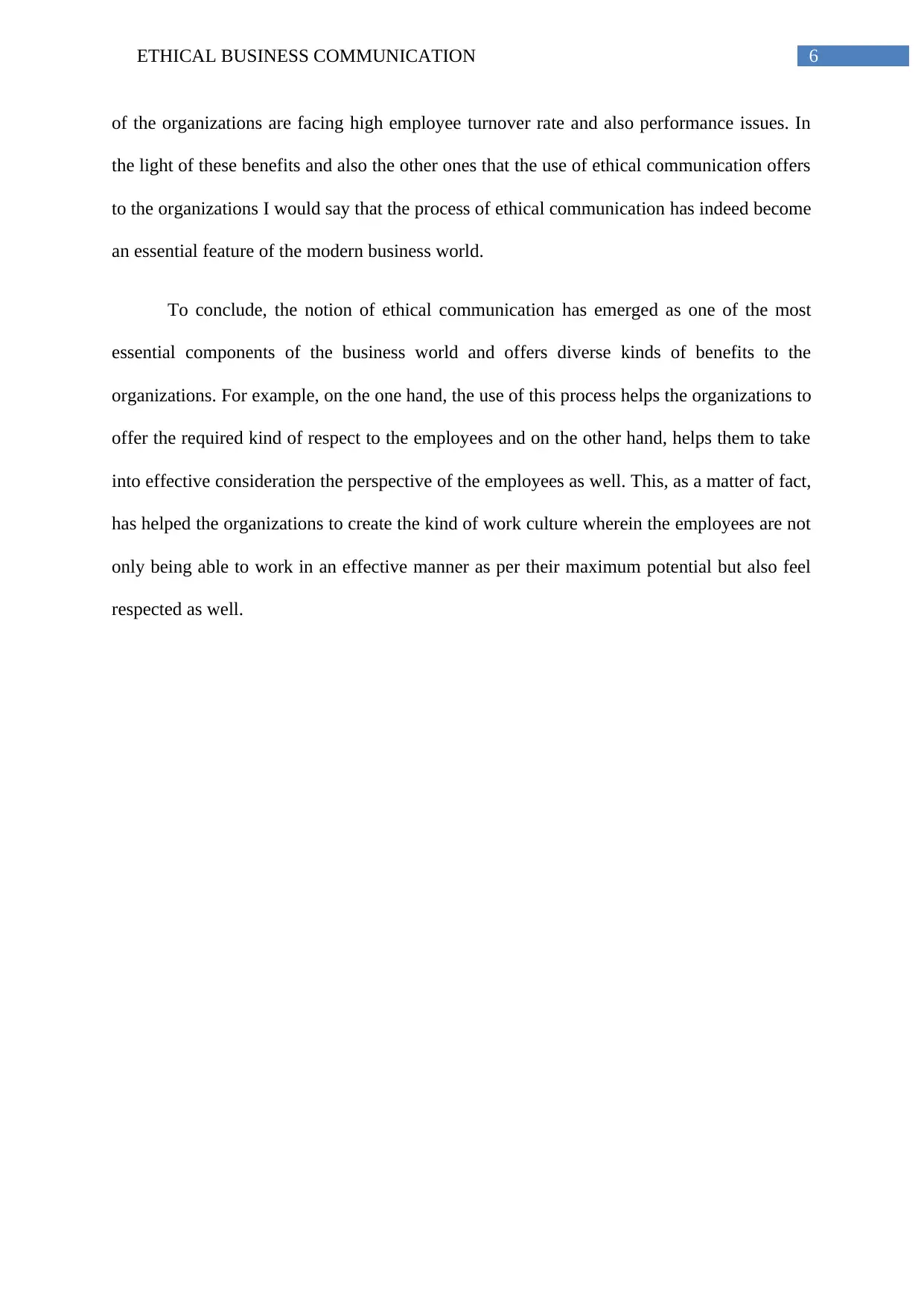
6ETHICAL BUSINESS COMMUNICATION
of the organizations are facing high employee turnover rate and also performance issues. In
the light of these benefits and also the other ones that the use of ethical communication offers
to the organizations I would say that the process of ethical communication has indeed become
an essential feature of the modern business world.
To conclude, the notion of ethical communication has emerged as one of the most
essential components of the business world and offers diverse kinds of benefits to the
organizations. For example, on the one hand, the use of this process helps the organizations to
offer the required kind of respect to the employees and on the other hand, helps them to take
into effective consideration the perspective of the employees as well. This, as a matter of fact,
has helped the organizations to create the kind of work culture wherein the employees are not
only being able to work in an effective manner as per their maximum potential but also feel
respected as well.
of the organizations are facing high employee turnover rate and also performance issues. In
the light of these benefits and also the other ones that the use of ethical communication offers
to the organizations I would say that the process of ethical communication has indeed become
an essential feature of the modern business world.
To conclude, the notion of ethical communication has emerged as one of the most
essential components of the business world and offers diverse kinds of benefits to the
organizations. For example, on the one hand, the use of this process helps the organizations to
offer the required kind of respect to the employees and on the other hand, helps them to take
into effective consideration the perspective of the employees as well. This, as a matter of fact,
has helped the organizations to create the kind of work culture wherein the employees are not
only being able to work in an effective manner as per their maximum potential but also feel
respected as well.
Paraphrase This Document
Need a fresh take? Get an instant paraphrase of this document with our AI Paraphraser
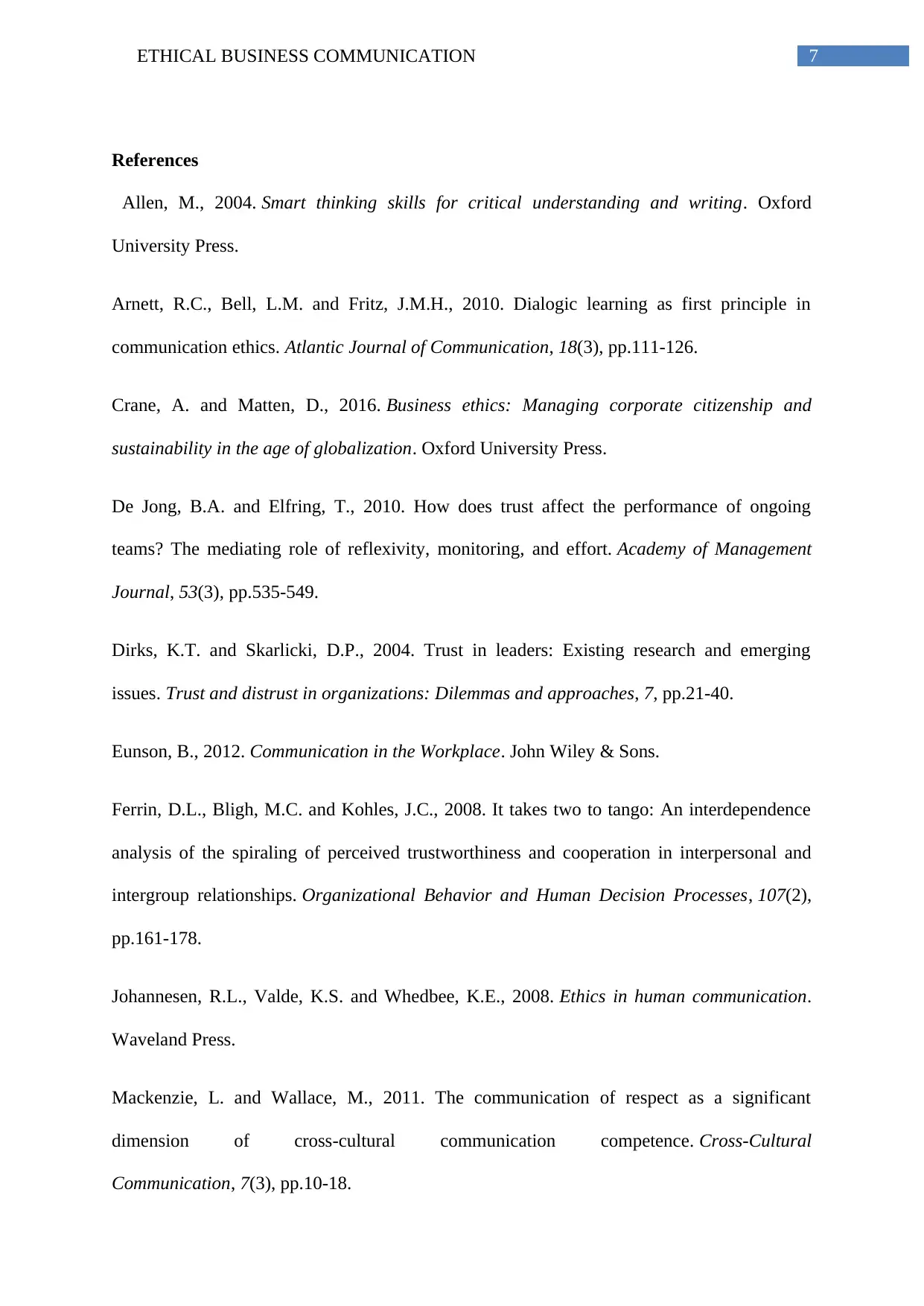
7ETHICAL BUSINESS COMMUNICATION
References
Allen, M., 2004. Smart thinking skills for critical understanding and writing. Oxford
University Press.
Arnett, R.C., Bell, L.M. and Fritz, J.M.H., 2010. Dialogic learning as first principle in
communication ethics. Atlantic Journal of Communication, 18(3), pp.111-126.
Crane, A. and Matten, D., 2016. Business ethics: Managing corporate citizenship and
sustainability in the age of globalization. Oxford University Press.
De Jong, B.A. and Elfring, T., 2010. How does trust affect the performance of ongoing
teams? The mediating role of reflexivity, monitoring, and effort. Academy of Management
Journal, 53(3), pp.535-549.
Dirks, K.T. and Skarlicki, D.P., 2004. Trust in leaders: Existing research and emerging
issues. Trust and distrust in organizations: Dilemmas and approaches, 7, pp.21-40.
Eunson, B., 2012. Communication in the Workplace. John Wiley & Sons.
Ferrin, D.L., Bligh, M.C. and Kohles, J.C., 2008. It takes two to tango: An interdependence
analysis of the spiraling of perceived trustworthiness and cooperation in interpersonal and
intergroup relationships. Organizational Behavior and Human Decision Processes, 107(2),
pp.161-178.
Johannesen, R.L., Valde, K.S. and Whedbee, K.E., 2008. Ethics in human communication.
Waveland Press.
Mackenzie, L. and Wallace, M., 2011. The communication of respect as a significant
dimension of cross-cultural communication competence. Cross-Cultural
Communication, 7(3), pp.10-18.
References
Allen, M., 2004. Smart thinking skills for critical understanding and writing. Oxford
University Press.
Arnett, R.C., Bell, L.M. and Fritz, J.M.H., 2010. Dialogic learning as first principle in
communication ethics. Atlantic Journal of Communication, 18(3), pp.111-126.
Crane, A. and Matten, D., 2016. Business ethics: Managing corporate citizenship and
sustainability in the age of globalization. Oxford University Press.
De Jong, B.A. and Elfring, T., 2010. How does trust affect the performance of ongoing
teams? The mediating role of reflexivity, monitoring, and effort. Academy of Management
Journal, 53(3), pp.535-549.
Dirks, K.T. and Skarlicki, D.P., 2004. Trust in leaders: Existing research and emerging
issues. Trust and distrust in organizations: Dilemmas and approaches, 7, pp.21-40.
Eunson, B., 2012. Communication in the Workplace. John Wiley & Sons.
Ferrin, D.L., Bligh, M.C. and Kohles, J.C., 2008. It takes two to tango: An interdependence
analysis of the spiraling of perceived trustworthiness and cooperation in interpersonal and
intergroup relationships. Organizational Behavior and Human Decision Processes, 107(2),
pp.161-178.
Johannesen, R.L., Valde, K.S. and Whedbee, K.E., 2008. Ethics in human communication.
Waveland Press.
Mackenzie, L. and Wallace, M., 2011. The communication of respect as a significant
dimension of cross-cultural communication competence. Cross-Cultural
Communication, 7(3), pp.10-18.
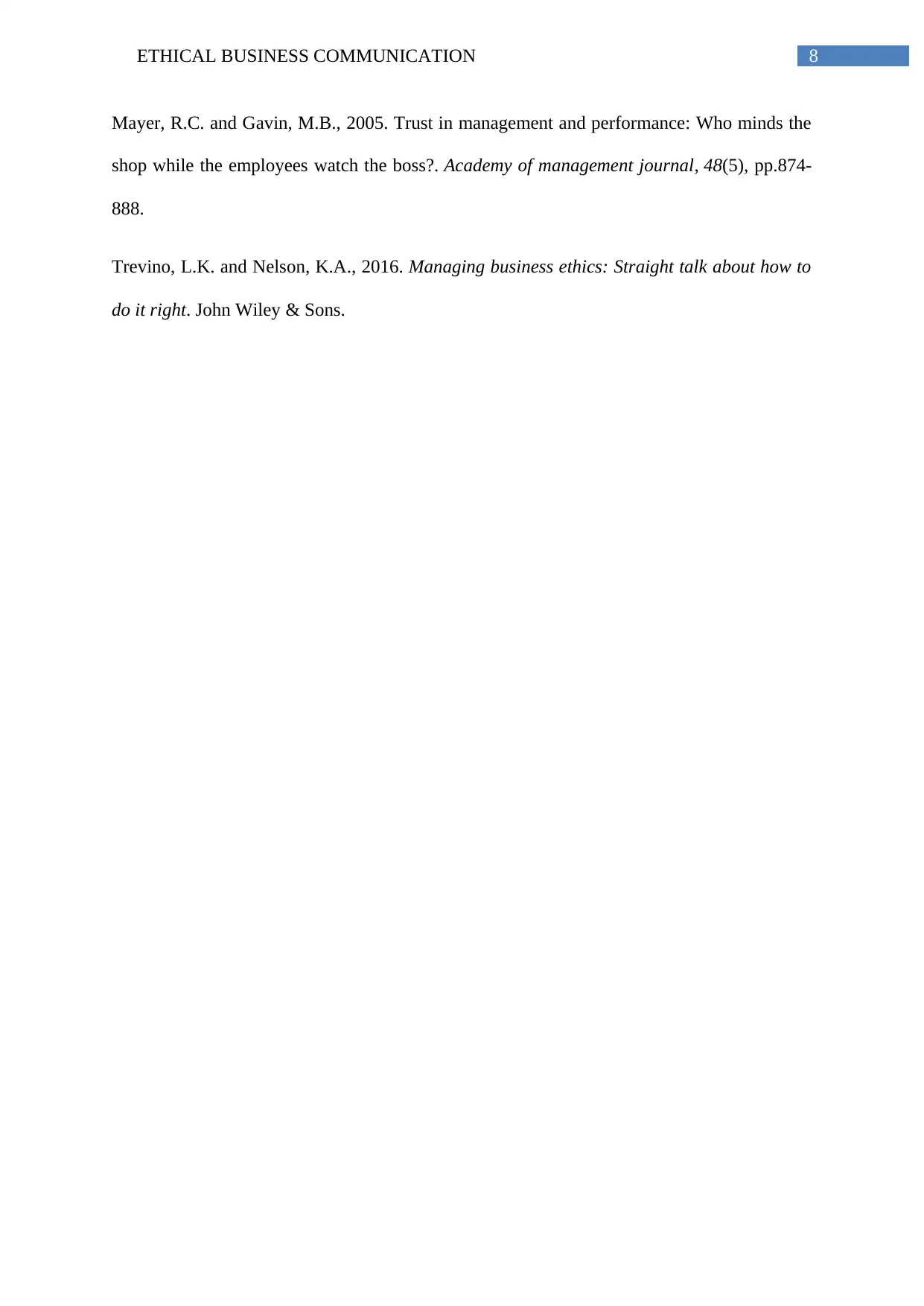
8ETHICAL BUSINESS COMMUNICATION
Mayer, R.C. and Gavin, M.B., 2005. Trust in management and performance: Who minds the
shop while the employees watch the boss?. Academy of management journal, 48(5), pp.874-
888.
Trevino, L.K. and Nelson, K.A., 2016. Managing business ethics: Straight talk about how to
do it right. John Wiley & Sons.
Mayer, R.C. and Gavin, M.B., 2005. Trust in management and performance: Who minds the
shop while the employees watch the boss?. Academy of management journal, 48(5), pp.874-
888.
Trevino, L.K. and Nelson, K.A., 2016. Managing business ethics: Straight talk about how to
do it right. John Wiley & Sons.
⊘ This is a preview!⊘
Do you want full access?
Subscribe today to unlock all pages.

Trusted by 1+ million students worldwide
1 out of 9
Your All-in-One AI-Powered Toolkit for Academic Success.
+13062052269
info@desklib.com
Available 24*7 on WhatsApp / Email
![[object Object]](/_next/static/media/star-bottom.7253800d.svg)
Unlock your academic potential
Copyright © 2020–2026 A2Z Services. All Rights Reserved. Developed and managed by ZUCOL.
